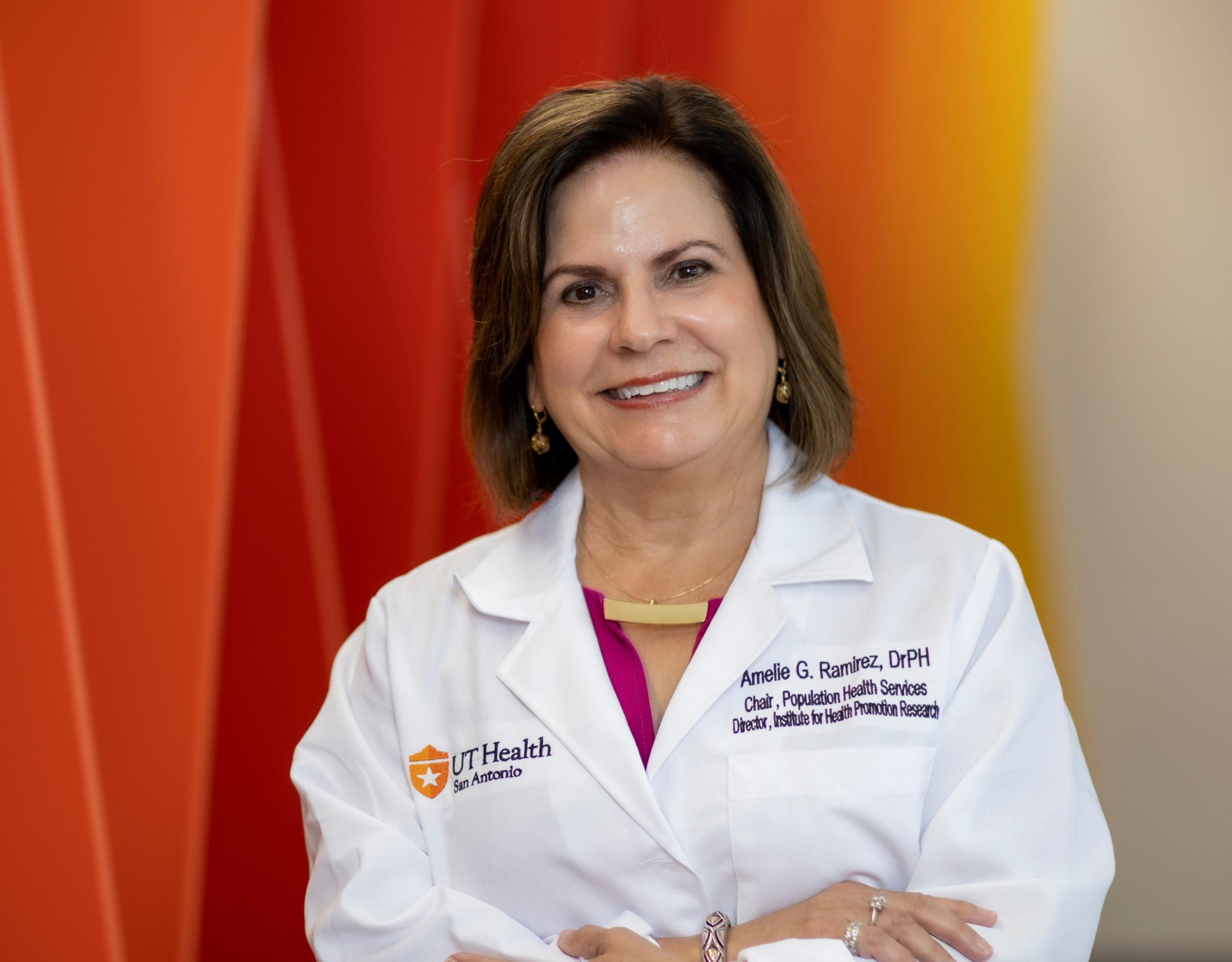
Dr. Amelie Ramirez: Address Social Determinants of Health in Patients
Where you live can have a big impact on your health.
In fact, our health is influenced by a variety of non-medical factors, such as the conditions in which we are born, grow, live, work, and age.
These conditions are known as social determinants of health (SDoH).
Addressing SDoH is key to improving health for Latinos and all people, said Dr. Amelie Ramirez, leader of Salud America! at UT Health San Antonio, in a panel presentation on Dec. 5, 2023, at the San Antonio Breast Cancer Symposium.
“What we’re finding is that these inequities in SDoH can create social needs that negatively impact our health,” Ramirez said.
Screening for Social Determinants of Health (SDoH)
Studies suggest that SDoH accounts for between 30-55% of health outcomes. SDoH also influences individual health behaviors, which account for another 30% of health outcomes.
Fortunately, healthcare systems are starting to emphasize SDoH screening.
This means that when patients come to medical appointments, they may be asked to fill out a questionnaire to help healthcare providers identify social needs and make referrals to community resources and support. Social needs include a lack of healthy food, transportation, and more.

Ramirez and other experts explored SDoH screening their panel at the San Antonio Breast Cancer Symposium.
Ramirez shared examples of SDoH screening in action at Nemours Children’s Health and community clinics. She also listed screening tools.
Dr. Susan T. Vadaparampil added that addressing SDoH can help patients experience fewer complications and improved quality of health care.
“If we don’t start with a baseline of measuring and being strategic about what we’re doing across all of these fronts, we are going to have a hard time figuring out what worked,” Vadaparampil said.
Dr. Ramirez & Her Healthy Equity Research
Ramirez is an internationally recognized health disparities researcher at UT Health San Antonio.
Here, she is professor and chair of the Department of Population Health Sciences and director of the Institute for Health Promotion Research at UT Health San Antonio. She also is associate director of cancer outreach and engagement at the Mays Cancer Center.

For more than 30 years, Ramirez gained experience developing research and communication models to improve Latino health locally and nationally.
She currently directs the Salud America! national multimedia program. The program creates Latino-focused stories and action tools empower its network of over 400,000 community and school leaders to drive healthy policy and system changes to promote health equity and support for Latino families.
Ramirez also recently launched the “Avanzando Equidad de Salud: Latino Cancer Health Equity Research Center.”
The 4-year, $4.08-million grant from the American Cancer Society is a response to cancer inequities facing Latinos in South Texas.
The center will unite South Texas research scholars and the community to reduce health disparities across the cancer care continuum by targeting social determinants of health that prevent Latinos from obtaining equitable care.
“Our new center will conduct a unique combination of community-engaged research, training, patient assessment, and advocacy to address the social determinants of health — such as access to healthcare, financial strain, and food insecurity —that deter Latinos from equitable access to cancer care, prevention, early detection, and treatment,” Ramirez said.
“We aim to help reduce the risks for South Texans in developing cancer and improving their quality of life should they be diagnosed with cancer.”
Dr. Ramirez & Her Latino Cancer and Education Research
Ramirez conducts research and interventions to reduce Latino cancer disparities.
She aims to reduce lung cancer with Quitxt. This bilingual text-message service helps Latino young adults quit smoking, funded by the Cancer Prevention and Research Institute of Texas.
On the topic of breast cancer, Ramirez is a Susan G. Komen Scholar. Her work has helped increase Latino cancer screening rates and early detection. She has proven how bicultural patient navigation can help Latina patients get more timely diagnosis and treatment after an abnormal mammogram and improve the survivorship journey.
Ramirez also leads the South Texas site of the Avanzando Caminos study. The study aims to enroll 1,500 Latino cancer survivors in South Texas and 1,500 more in Miami to help unpack the social, cultural, behavioral, mental, biological, and medical influences on post-cancer life.
Another of her efforts is to improve Latino participation in clinical trials.
Ramirez is enabling Latinos to volunteer for cancer and Alzheimer’s clinical trials. She is highlighting open clinical trials, conducting webinars, and sharing stories of real Latino clinical trial participants. This work is supported by Genentech, a member of the Roche Group.
Ramirez also has trained/mentored more than 250 Latinos in health fields.
She leads the National Cancer Institute-funded Éxito! training program. This helps master’s-level students and professionals pursue a doctoral degree and cancer research career. Of 226 Éxito! trainees since 2011, over 27% have enrolled in or graduated from a doctoral program.
“We work hard to enable Latinos take the next steps from a master’s degree to get their doctoral degree and focus on careers in Latino cancer research and prevention,” Ramirez said.
Dr. Ramirez & Her Service, Recognition
Ramirez is an elected member of the National Academy of Medicine.
She also is a Susan G. Komen Scholar, is on the prize jury for the Fries Prize for Improving Health Award and the Elizabeth Fries Health Education Award, and is a past member of the National Advisory Council on Minority Health and Health Disparities of the National Institute on Minority Health and Health Disparities.
In Texas, she is on the San Antonio Mayor’s Fitness Council and is Past Board President of the The Academy of Medicine, Engineering and Science of Texas (TAMEST).

Additional recognition includes:
- 2011: White House Champion of Change
- 2014: APHA Everett M. Rogers Public Health Communication Award
- 2018: Icons in Healthcare Award from CentroMed
- 2018: Leadership of the 1st Advancing the Science of Cancer in Latinos conference
- 2019: Lifetime Achievement Award in Health Equity from the Society of Behavioral Medicine
- 2019: Bluebonnet Award of the Texas Academy of Nutrition and Dietetics
- 2020: Leadership of the 2nd Advancing the Science of Cancer in Latinos conference
- 2020: CDC Board of Directors
- 2021: Heroes of the Fight Against COVID-19 of Latino Leaders magazine
- 2021-2022: Chair of the the Women in Cancer Research Council of the American Association for Cancer Research (AACR)
- 2022: Outstanding Support of Hispanic Issues Award from the American Association of Hispanics in Higher Education, Inc.
- 2023: Inducted into the San Antonio Women’s Hall of Fame
Ramirez also created the Advancing the Science of Cancer in Latinos biennial conference series.
Launched in 2018 and continued in 2020, 2022, and 2024, the conference welcomes international researchers, physicians, community leaders, patient advocates, and more to tackle Latino cancer from prevention to treatment to survivorship.
“Advancing the Science of Cancer in Latinos is a sanctuary where we can share research, experience, and action to translate basic research into clinical best practices, effective community interventions, and professional training programs to eliminate cancer disparities in Latinos,” Ramirez said.
In 2022, TV personality Oprah Winfrey selected Ramirez as a “Cycle Breaker” for her groundbreaking work to build health equity in the Latino community. Watch the episode featuring Ramirez!
Ramirez earned M.P.H. and Dr.P.H. degrees from UT Health Science Center at the Houston School of Public Health.
She is a native of Laredo, Texas.
The post Dr. Amelie Ramirez: Address Social Determinants of Health in Patients appeared first on Salud America.

